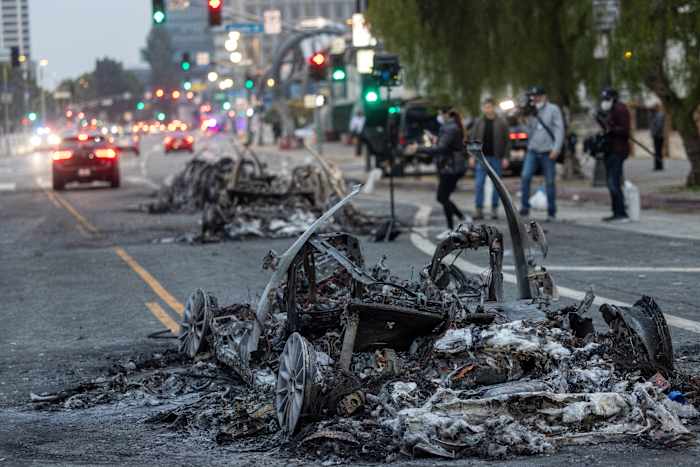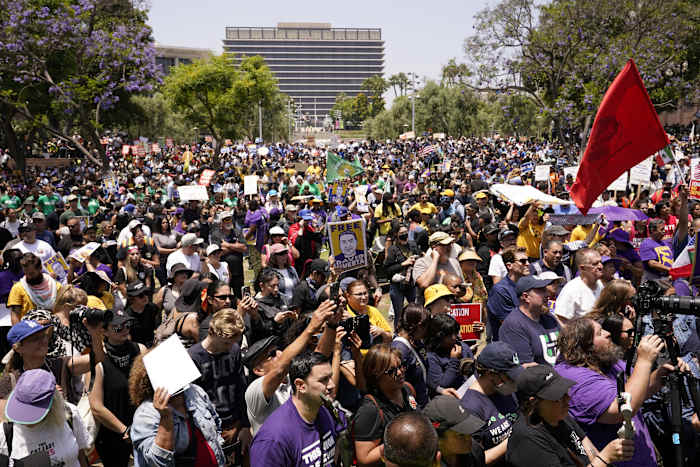Unrest
Marines arrive under Trump orders
Hundreds of US Marines have arrived in Los Angeles and more were expected under orders from US President Donald Trump, who has also activated 4000 National Guard troops to quell protests despite objections from California Governor Gavin Newsom and other local leaders.
The city has seen days of public outrage since the Trump administration launched a series of immigration raids last week, though local officials said the demonstrations yesterday were largely peaceful.
As LA business owners clean up, residents lament looting and federal response. – Reuters
About half of the roughly 700 Marines that Trump ordered to Los Angeles have arrived, and the remaining troops will enter the city later in the day, a US official said. The US military did not immediately respond to a request for comment.
Los Angeles Mayor Karen Bass told KABC that more than 100 people had been arrested overnight but that the majority of protesters were nonviolent.
The Marines will protect federal property and personnel alongside Guard troops, US Northern Command said in a statement announcing the move. There were approximately 1700 Guard troops in greater Los Angeles, with more on the way.
Convoy of buses depart US military base as Marines are deployed to Los Angeles protest. - Reuters
Trump has justified his decision to deploy active military troops to Los Angeles by describing the protests as a violent occupation, a characterization that Newsom and Bass have said is grossly exaggerated.
Newsom accused Trump of sending troops to deliberately inflame the situation and said the president's actions made it more difficult for local law enforcement to respond to the demonstrations.
In a social media post, Trump said Los Angeles would be "burning to the ground right now" if he had not deployed troops to the city.
Since protests broke out last week they have been largely peaceful, although there have been isolated clashes, with some demonstrators throwing rocks and other objects at officers, blocking an interstate highway and setting several cars ablaze. Several businesses were looted, including an Apple store and a CVS pharmacy. Police have responded by firing projectiles such as pepper balls, as well as flash-bang grenades and tear gas.
Los Angeles mayor says LA was peaceful before ICE raids. – AP
Police said they had arrested 21 people on the weekend on charges including attempted murder with a Molotov cocktail and assaulting an officer, and officials said they expected more arrests after reviewing video.
In a statement, Los Angeles Police Chief Jim McDonnell said the department had not been notified that any Marines were travelling to the city and that their arrival "presents a significant logistical and operational challenge."
Trump's Marine deployment escalated his confrontation with Newsom, who has filed a lawsuit asserting that Trump's activation of Guard troops without the governor's consent was illegal.
Burnt out cars in Los Angeles. – Reuters
The Guard deployment was the first time in decades that a president did so without a request from a sitting governor.
The use of active military to respond to civil disturbances is extremely rare.
"This isn't about public safety," Newsom wrote on X. "It's about stroking a dangerous president's ego."
The top Democrat on the Senate Armed Services Committee, Senator Jack Reed, said he was "gravely troubled" by Trump's deployment of active-duty Marines.
"Since our nation's founding, the American people have been perfectly clear: we do not want the military conducting law enforcement on US soil," he said.
US Marines are trained for conflicts around the world – from the Middle East to Africa – and are also used for rapid deployments in case of emergencies, such as threats to US embassies.
In addition to combat training, which includes weapons training, some units also learn riot and crowd control techniques.
Demonstrations and arrests
The raids are part of Trump's sweeping immigration crackdown, which Democrats and immigrant advocates have said are indiscriminately breaking up families.
US Homeland Security Secretary Kristi Noem has pledged to carry out more operations to round up suspected immigration violators. Trump officials have branded the protests as lawless and blamed state and local Democrats for protecting undocumented immigrants in sanctuary cities.

An officer pulls a scooter off a Highway Patrol vehicle as protesters throw objects. – AP
Hundreds of demonstrators gathered outside a federal detention centre in downtown Los Angeles where immigrants have been held, chanting "free them all" and waving Mexican and Central American flags.
National Guard forces formed a human barricade to keep people out of the building, and police began dispersing the crowd using gas canisters and arrested some protesters.
At dusk, officers had running confrontations with protesters who had scattered into the Little Tokyo section of the city. As people watched from apartment patios above street level and as tourists huddled inside hotels, a large contingent of LAPD and officers and sheriff's deputies fired several flash bangs that boomed through side streets along with tear gas.
California pursues lawsuit against Trump over National Guard deployment. – AP
Protests spread to neighbouring Orange County after immigration raids there, with demonstrators gathering at the Santa Ana Federal Building, according to local officials and news reports.
Protests also sprang up in at least nine other US cities, including New York, Philadelphia and San Francisco, according to local news reports.
In Austin, Texas, police fired non-lethal munitions and detained several people as they clashed with a crowd of several hundred protesters.
Does US law allow Trump to send troops to quell protests?
What laws did Trump cite to justify the deployment?
Trump cited Title 10 of the US Code, a federal law that outlines the role of the US Armed Forces, in his June 7 order to call members of the California National Guard into federal service.
A provision of Title 10 – Section 12406 – allows the president to deploy National Guard units into federal service if the US is invaded, there is a “rebellion or danger of rebellion” or the president is “unable with the regular forces to execute the laws of the United States.”
What can National Guard Troops do under cited law?
An 1878 law, the Posse Comitatus Act, generally forbids the US military, including the National Guard, from taking part in civilian law enforcement.
Section 12406 does not override that prohibition, but it allows troops to protect federal agents who are carrying out law enforcement activity and to protect federal property.
For example, National Guard troops cannot arrest protesters, but they could protect US Immigration and Customs Enforcement who are carrying out arrests.
What does California's lawsuit say?
California's lawsuit said the deployment of troops in the state without the governor's consent violates federal law and the US Constitution's 10th Amendment, which protects states' rights.
The state argues the deployment does not meet any of the requirements in Title 10 because there was no “rebellion,” no "invasion" and no situation that prevented the enforcement of US laws in the state.
Trump also did not consult with Newsom before deploying the National Guard, violating Section 12406's requirement that orders to deploy the National Guard "shall be issued through the governors of the States," according to the lawsuit.
What is the lawsuit asking for?
The lawsuit seeks a declaration from the court that Trump's order is unlawful and an injunction blocking it from being enforced.
How might a court view the dispute?
There is little precedent for such a dispute. Section 12406 has only ever been invoked once before to deploy the National Guard, when then-president Richard Nixon called upon it to deliver the mail during the 1970 Postal Service Strike, according to Bonta.
Five legal experts from both left- and right-leaning advocacy organizations cast doubt on Trump’s use of Title 10 in response to the immigration protests and called it inflammatory and reckless, especially without Newsom's support.
The protests in California do not rise to the level of “rebellion” and do not prevent the federal government from executing the laws of the United States, experts said.
Legal experts were split on whether a court would back Newsom’s interpretation of the governor’s role under Section 12406.
Courts have traditionally given great weight to the word “shall” in interpreting other laws, which supports Newsom's position that governors must be involved in calling in the National Guard. But other experts said the law was written to reflect the norms of how National Guard troops are typically deployed, rather than giving a governor the option to not comply with a president's decision to deploy troops.
What other laws could Trump invoke?
Trump could take a more far-reaching step by invoking the Insurrection Act of 1792, which would allow troops to directly participate in civilian law enforcement, for which there is little recent precedent.
Senior White House officials, including US Vice President JD Vance and senior White House aide Stephen Miller, have used the term "insurrection" when discussing the protests, but the administration has stopped short of invoking the act thus far.
It has been used by past presidents to deploy troops within the US in response to crises like the 1794 Whiskey Rebellion and the rise of the Ku Klux Klan in the immediate aftermath of the American Civil War. The law was last invoked by president George H.W. Bush in 1992, when the governor of California requested military aid to suppress unrest in Los Angeles following the trial of Los Angeles police officers who beat Black motorist Rodney King.
But the last time a president deployed the National Guard in a state without a request from that state's governor was 1965, when president Lyndon Johnson sent troops to protect civil rights demonstrators in Montgomery, Alabama.
What about the Marines?
Trump has more direct authority over the Marines than the National Guard, under Title 10 and in his constitutional role as commander in chief of the armed forces, legal experts said.
But unless Trump invokes the Insurrection Act, the Marines are subject to legal restrictions that prevent them from taking part in "any search, seizure, arrest or other similar activity." The Defense Department said that the Marines were ready to support the National Guard's efforts to protect federal personnel and federal property in Los Angeles, emphasizing the relatively limited scope of their role at the moment.










